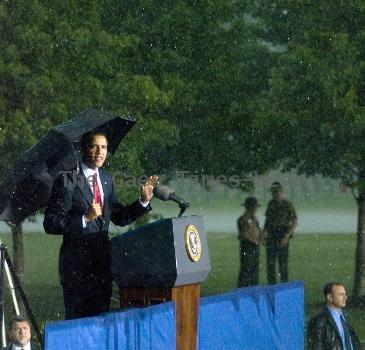Salazar defends decision to scrap Utah oil-lease sale in last days of Bush administration
By Paul Foy, APTuesday, July 13, 2010
Salazar defends pulling oil-lease parcels in Utah
SALT LAKE CITY — Interior Secretary Ken Salazar on Tuesday defended his decision to scrap much of the Bush administration’s final oil-lease sale in Utah even though his inspector general found no evidence of department pressure to rush the auction.
Salazar spokeswoman Kendra Barkoff told The Associated Press that Salazar acknowledges the investigation found no evidence federal employees were ordered to speed up a sale of drilling parcels near Utah’s national parks.
She said, however, that the report had no bearing on Salazar’s decision to scrap 77 of the leases two months after taking office.
The 10-page report submitted by John Dupuy, the assistant inspector general for investigations, was dated Dec. 28, 2009, but wasn’t released until late Monday. A copy was first sought under an open-records request by U.S. Rep. Rob Bishop, R-Utah, who examined a draft in April.
The 77 leases, valued at $6.2 million, were already being held up by a federal lawsuit and Salazar wanted to take a “fresh look” at the parcels before deciding whether to release them, Barkoff said. The bidders got their money back.
Barkoff said Salazar wasn’t available for comment Tuesday.
The lawsuit that blocked the release of the 77 leases around Arches and Canyonlands national parks has yet to be resolved. Environmental groups who filed suit contend the Bush administration skirted environmental laws in approving land-use plans that made the sale possible.
Salazar has criticized the auction as a rush job that threatened Utah’s most magnificent landscapes, including parcels around artifact-rich Nine Mile Canyon and along the high cliffs of whitewater sections of the Green River.
Investigators found no evidence in interviews of key BLM officials or in a review of e-mails that Bush administration appointees pressured employees to rush the sale, the report said.
The report, however, faulted BLM for contributing to a perception that the sale was rushed in the month before President Barack Obama took office. It cited, among other issues, the failure to provide advance notice to the National Park Service and the agency’s initial refusal to take many of the parcels close to Utah’s red rock parks off the list when the park service objected.
The BLM initially was going to auction a parcel so close to Delicate Arch, the signature landmark at Arches near Moab, that drill rigs might have been visible through the center of the 33-foot-wide rock formation. It was taken off the auction list after the park service protested, but other parcels within view of Arches and Canyonlands and another that borders Dinosaur National Monument remained on the list for sale.
“Salazar justified his decision because the 77 leases were allegedly rushed in the last days of the Bush administration,” said Kathleen Sgamma, the government-aiffars director for the Western Energy Alliance, a Denver-based trade for oil and gas producers. “This IG report shows that assertion to be false.”
Environmental groups said the report was focused narrowly on allegations federal employees were pressured to justify the sale. The inspector general’s office confirmed it avoided broader policy questions Salazar cited in withdrawing the parcels.
“There was plenty wrong with the land-use plans that supported the lease sale, and with the lease sale itself, as the court’s order demonstrates,” said Heidi McIntosh, associate director for the Southern Utah Wilderness Alliance. “Those plans were thousands of pages long, and all came out within weeks. So there was pressure from somewhere.”
The auction on Dec. 19, 2008, was troubled from the start, when a Utah college student grabbed a bidder’s paddle to run up prices and take parcels between Arches and Canyonlands national parks for safekeeping.
Tim DeChristopher, who acknowledged he didn’t have $1.7 million to pay for his leases, has pleaded not guilty to felony counts of interfering with and making false representations at a government auction. He has said that he disrupted the auction as an act of civil disobedience to focus attention on climate change.
The half-year delay in the release of the investigators’ report was an oversight, said Kris Kolesnik, the associate inspector general for external affairs at the Interior Department.
“Not all OIG reports get posted to our website but this one should have been when it was released pursuant to a FOI request,” Kolesnik said Tuesday. “We are correcting this internal oversight by posting the report on our website.”
Tags: Barack Obama, Leisure Travel, Municipal Governments, North America, Outdoor Recreation, Recreation And Leisure, Salt Lake City, United States, Utah



